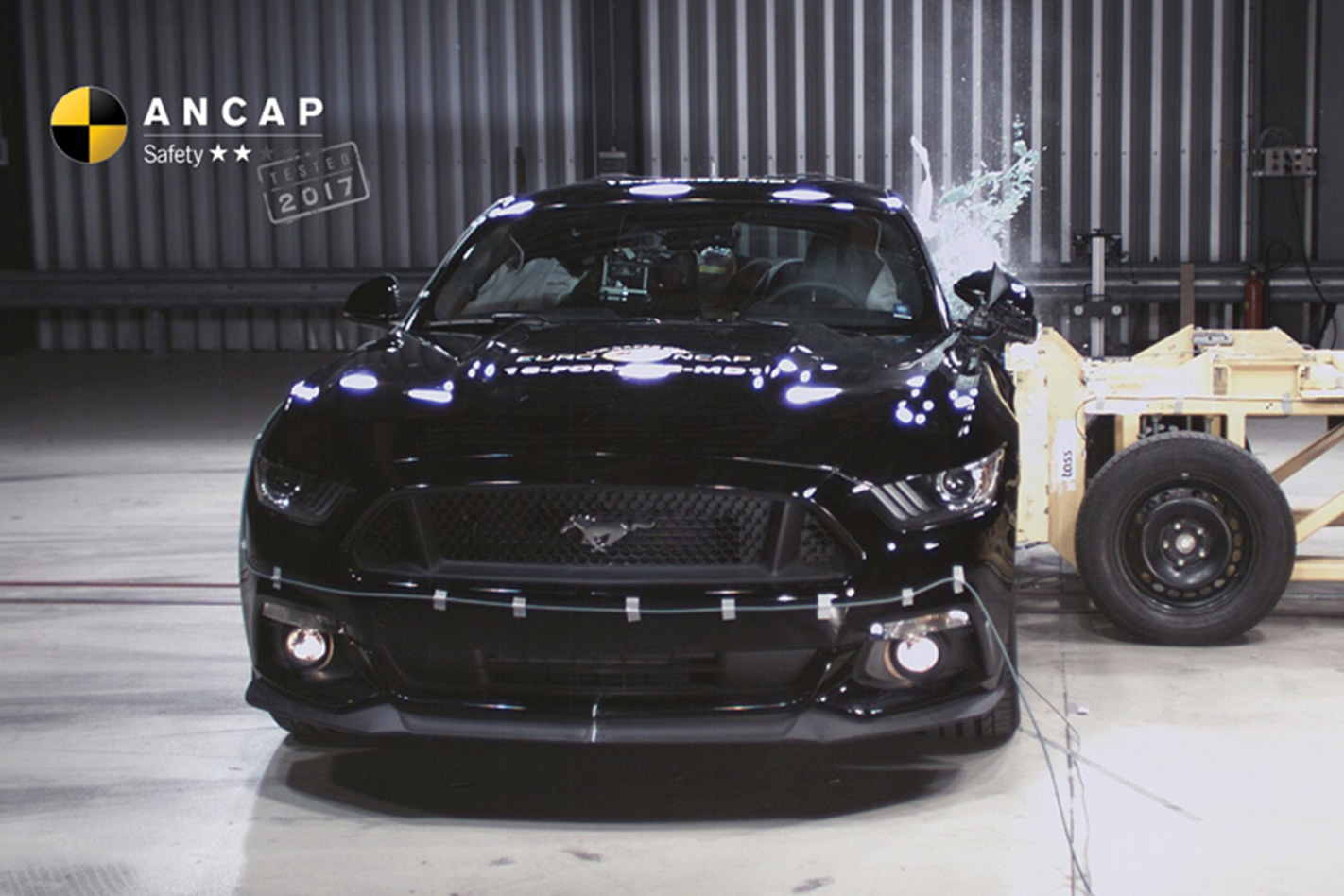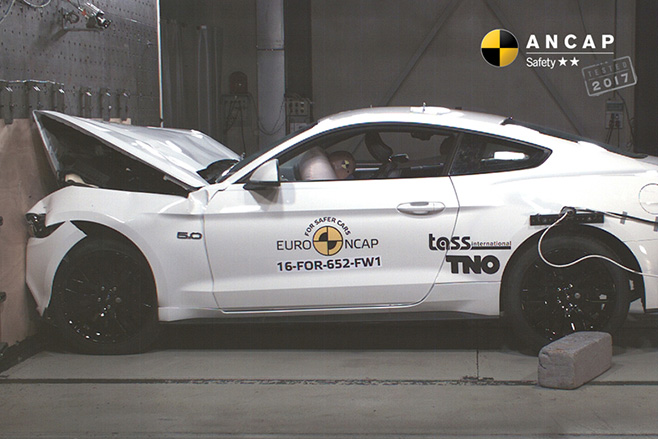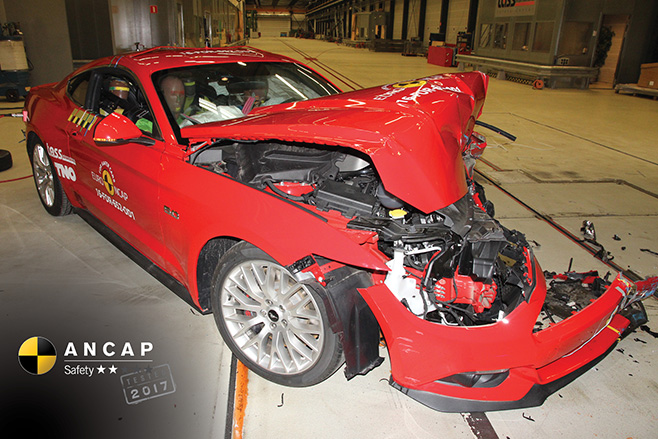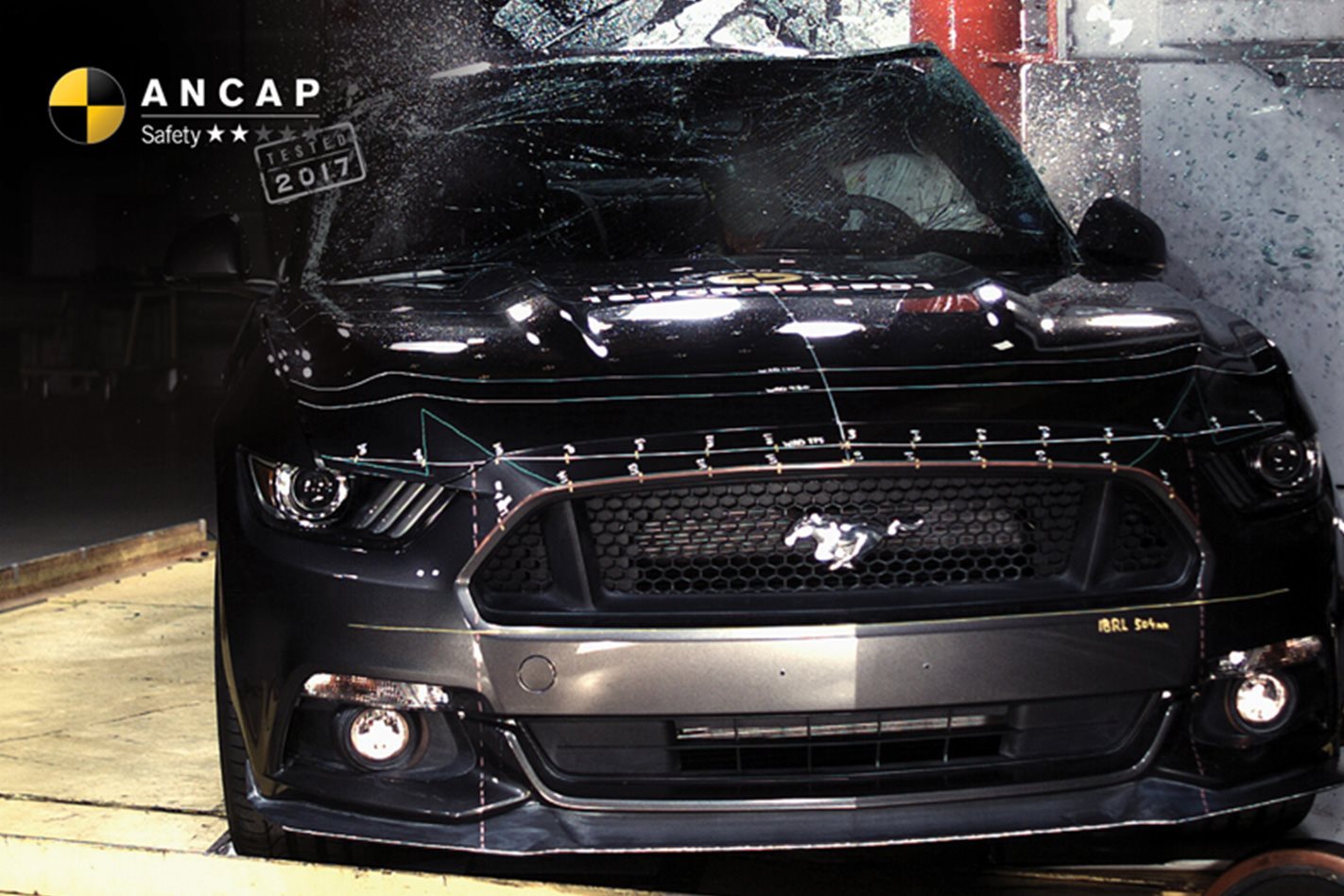THE Ford Mustang GT has been labelled unsafe following a dismal two-star independent crash test result that determined occupants could suffer serious injuries in a collision.
In a test conducted in conjunction with Euro NCAP, Australia’s leading independent crash test authority, the Australasian New Car Assessment Program (ANCAP) found the V8-powered, US-made sports car had poor occupant protection for both adults and children due to incorrectly inflating airbags, a sub-standard crash structure that included a door that came open in a side pole test, and a deficiency of crash avoidance technologies that are becoming increasingly common in new cars.
ANCAP chief executive James Goodwin slammed the safety of the V8-powered two-door coupe – the result doesn’t apply to four-cylinder Mustang because it wasn’t tested and may perform differently – that has been an unexpected sales hit for Ford.
RELATED OPINION: ANCAP might be flawed, but it’s also vital
“This result is simply shocking for such a newly designed and popular model,” Goodwin told Wheels, adding that the Mustang performed “below the expectations of what consumers would expect and, frankly, it’s not as safe as it should be”.

In a carefully worded statement Ford defended its muscle car and repeatedly described the ANCAP result as “disappointing”, suggesting that what it describes as a “rigorous new [testing] protocol” was introduced by ANCAP last year, well after development of the current Mustang had taken place.
The statement also asserted that the ANCAP tests were now “more tailored to family cars and people movers” than sports cars such as the Mustang.
Ford said the Mustang meets all applicable safety standards – many of which are embarrassingly low – and said it was competitive among sports cars, also performing well in overseas crash results, including those conducted by the US National Highway Traffic Safety Administration (NHTSA) and the Insurance Institute for Highway Safety (IIHS).
“The overall Euro NCAP rating is based on four pillars, with a very strong focus on family car safety characteristics and specific safety assist features, which are usually not part of the standard equipment of cars in the Mustang category,” the Ford statement read.
But Goodwin said the poor result was unacceptable for any car, especially one costing upwards of $45,990.
“I don’t think safety should be compromised, whatever car you’re buying. This is an expensive vehicle, it’s a newly designed vehicle and safety should never be compromised.”

ANCAP also stressed the combined Euro NCAP and ANCAP result was not because the vehicle was missing minor “safety assist” systems, which could be as simple as daytime running lights, a fatigue reminder or “hill launch assist”.
“This isn’t a score because it’s missing rear seatbelt reminders,” said Goodwin. “Fundamentally it also hasn’t performed well structurally. There is serious risk of head, leg and chest injuries for rear passengers. There was also insufficient inflation of both driver and passenger airbags in frontal offset test, which allowed the driver’s head to contact the steering wheel and the passenger’s head to contact the dashboard. The driver’s door opened in the pole test and the whiplash protection for rear-end collisions was only rated as marginal.”
The Mustang performed worst in the “Safety Assist” part of the NCAP test, one of four assessed areas, with just 16 percent, or 2 out of 12. Child occupant protection was marginally better but still poor at 32 percent, while adult occupant protection was 72 percent, let down by a score of 4.67 out of 8 in the frontal offset test.
Pedestrian protection was rated at 64 percent, although the official ANCAP report noted the front edge of the bonnet “posed a high injury risk for pedestrians”. The Mustang’s active bonnet is designed to pop up to help protect pedestrians from injuring themselves on hard parts such as the engine or suspension towers.
The Mustang’s two-star rating – which ANCAP described as “concerning” and “poor” – is the worst crash test result for a new model since the Chinese-made LDV V80 van of 2013 achieved a similar two-star rating. The only other passenger cars – as opposed to commercial vehicles – to have scored a two-star ANCAP rating were much older vehicles: the 2006 Chrysler Voyager, 2005 Holden Barina and 1998 Hyundai Sonata.

It’s unlikely the apparent crash structure issues with the Mustang can be addressed as part of a recall or service campaign and Ford appears to have no plans to do so – other than adding some active safety features as part of an update in 2018.
“The Mustang is a safe vehicle, equipped with advanced safety features and a structure designed to manage crash energy under a variety of crash modes,” Ford said.
“The Mustang has already proven its safety performance in NHTSA NCAP and IIHS test programs. We are committed to continued improvement in vehicle safety, and the 2018 Mustang in Australia will be equipped with driver assistance features such as AEB and Lane Keeping Aid.”
But Goodwin called on Ford to make changes on the production line to address the safety concerns raised.
“I’m encouraging Ford to introduce design and production changes to improve the vehicle’s safety performance as quickly as possible,” he said.
Goodwin also warned police forces around the country from considering the Mustang as a pursuit vehicle, suggesting the car was unsafe.
“The car has fallen down in lots of areas of its assessment and we would really expect that emergency services personnel would be in the safest car that they can be in.”
The Mustang, built for the first time in right-hand drive, has been a runaway hit for Ford Australia. The carmaker originally estimated it would sell 1000 of the coupes and convertibles in 2016, and instead it sold more than 6000.
See below for our questions and answers from Ford, unedited.
WHEELS: Is the Euro NCAP/ANCAP result a surprise to Ford?
FORD: We are disappointed by the Ford Mustang Euro NCAP rating. Mustang is a safe vehicle meeting, or exceeding, all applicable safety standards globally.
W: Does Ford agree with the NCAP result? If not, why not?
F: We are disappointed by the Ford Mustang ANCAP rating. Mustang is a safe car meeting, or exceeding, all applicable safety standards globally. Mustang’s safety credentials are further demonstrated by the five-star NHTSA NCAP rating awarded in the US as well as a ‘good’ IIHS rating.The overall Euro NCAP rating is based on four pillars, with a very strong focus on family car safety characteristics and specific safety assist features, which are usually not part of the standard equipment of cars in the Mustang category. Mustang delivered a four-star result for the front occupants and a five-star result for pedestrian safety. However, the two-star result in the Active Safety Assist pillar determined the overall result of a two-star rating.
W: Did Ford’s internal crash testing show issues similar to those which arose in the NCAP test?
F: The disappointing result from Euro-NCAP relates mainly to specific driver assistance technologies such as Autonomous Emergency Braking. We are committed to continued improvement in vehicle safety, and the 2018 Mustang in Australia will be equipped with driver assistance features such as AEB and Lane Keeping Aid. Mustang delivered a four-star result for the front occupants and a five-star result for pedestrian safety. However, the two-star result in the Active Safety Assist pillar determined the overall result of a two-star rating.
W: ANCAP suggests there are structural issues and airbag deployment issues that could result in serious injuries to occupants. Can these issues be addressed with cars already on the road or cars yet to be produced?
F: The ANCAP Injury Outcomes for Full Frontal scored ‘Good’ and for Frontal Offset ‘Acceptable’ for both drive and passenger head/neck.
W: Did Ford anticipate NCAP testing of the Mustang? If not, was the car developed only for other tests (NHTSA, etc)? If yes, why has it performed so poorly?
F: The most recent test protocol wasn’t in place at the time the current Ford Mustang was developed. The rigorous new protocol update, which was introduced in 2016/2017, is even more tailored to family cars and people movers.
W: Will Ford make any changes to the Mustang to address issues raised by NCAP testing?
F: The Mustang is a safe vehicle, equipped with advanced safety features and a structure designed to manage crash energy under a variety of crash modes. The Mustang has already proven its safety performance in NHTSA NCAP and IIHS test programs. We are committed to continued improvement in vehicle safety, and the 2018 Mustang in Australia will be equipped with driver assistance features such as AEB and Lane Keeping Aid.
W: Does Ford expect the NCAP result to affect Mustang sales in Australia?
F: The Mustang is a safe vehicle, equipped with advanced safety features and a structure designed to manage crash energy under a variety of crash modes. Mustang delivered a good four-star result for the front occupants, and a five-star result for pedestrian safety. We anticipate continued demand from Australian customers for this great vehicle.
W: Will Ford consider refunding any owners who don’t want to drive a car rated as having two-star safety?
F: Mustang is a safe vehicle. Customers can continue to enjoy their Mustang knowing that it features advanced safety features and a structure designed to manage crash energy under a variety of crash modes. Mustang delivered a four-star result for the front occupants and a five-star result for pedestrian safety.
W: Any other comments or points you feel are worth making.
F: The Mustang features a suite of advanced safety features including an ‘active’ pop-up bonnet, as well as driver and front passenger airbags, front and passenger knee airbags. It also offers front driver and passenger airbags, curtain airbags, knee airbags as well as driver/passenger side impact airbags. A Driver and front passenger seatbelt reminder system is standard.
SYNC 3, standard on Mustang, includes voice-enabled sat-nav for hands-free operation, as well as a rear-view camera and MyKey technology. MyKey gives parents of younger driver’s peace of mind by reducing distractions and limiting speed. It enables vehicle owners to limit stereo volume, increase the frequency of Mustang’s front seat belt reminders, and block incoming phone calls and text messages while other drivers are behind the wheel.
SYNC 3 also offers Emergency Assistance as standard on Mustang, which automatically calls the emergency services in the event.





